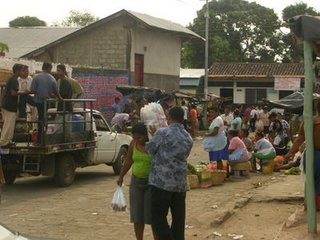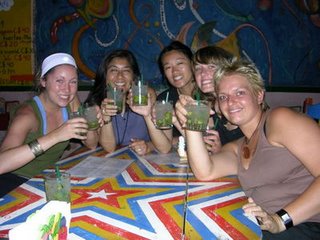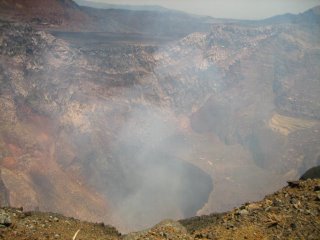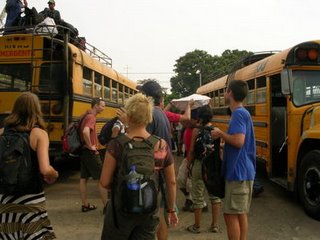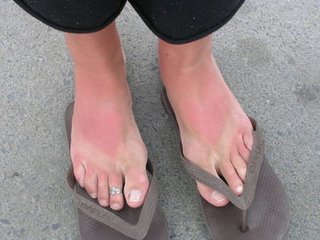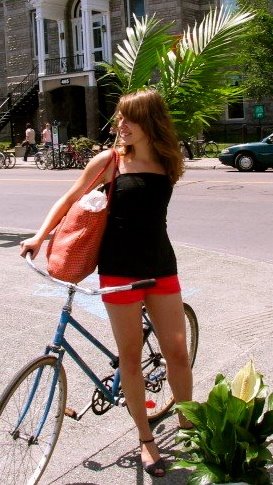So what if the security guard at the guest-house shoots at tourists with his cap gun? He only does it because we know he's joking. Right?
That's why I love Nicaragua; even in its cities I felt safe. I treated myself to solo walks. Alone. Alone and thinking, my mother would have a heart attack.
The colonial architecture was stunning. So were the colours. And, the lifestyle. About a block from my guest-house, an abandoned, turquoise colonial-era building was "infested" with small green parrots. Parrots. Think about that.
Reveling in this sensation, but tired, my Australian travel-mate and I decided to stay in and rest, on our first night in this new city. We bought a bottle of the local brew to enjoy after hours in the common room of the guesthouse. Its windows opened to the street where a total of four security guards, seated in rocking chairs, protected the entrance. 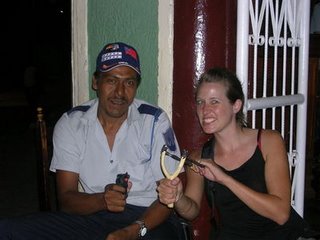
At first I thought this was simply over-staffing, but each guard had hidden a bottle of beer behind his rocking chair. This wasn't an opportunity to analyze their staffing policies, it was a party. Within minutes the two guards who were actually on the job invited us to join them.
None spoke English, but they were happy to repeat themselves until I understood well enough to translate for my blonde, busty Australian friend. They were both surprised and delighted that we’d accepted. Offering us their rocking chairs, they ran across the street to ask the closed bar to reopen. I’m not sure if anyone paid for the drinks, but they were free for us, and the bar kept serving until we went to bed.
They asked the usual questions and teased each other about their competency, both as security professionals and husbands. They asked about my home in Canada (and whether it was really as cold as they say), and I asked about theirs around the corner. The guard seated closest to me argued that hammocks are infinitely more comfortable than beds. I heartily agreed, until I realized what he was getting at.
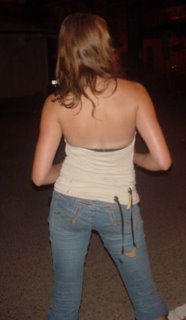 The city is safe, even for a tourist like you, he reassured me, checking out my legs. Of course it is safe, I said, hoping to change the path of the conversation. I carry this! And, I showed them the handmade catapult I'd picked up at the local market. Ultimately, I carried this weapon in my back pocket from Nicaragua to Panama. As was intended, they laughed at me. And then, they pulled their weapons.
The city is safe, even for a tourist like you, he reassured me, checking out my legs. Of course it is safe, I said, hoping to change the path of the conversation. I carry this! And, I showed them the handmade catapult I'd picked up at the local market. Ultimately, I carried this weapon in my back pocket from Nicaragua to Panama. As was intended, they laughed at me. And then, they pulled their weapons.
Taking turns demonstrating how each was used, they had me both fascinated and nervous. I mean, they were drunk. Mostly, they used clubs and cuffs, but the head guard also carried a cap gun that he fired freely at hotel guests and passers-by.
Exactly then, a larger and drunker man stumbled down the road in front of us and toppled over. His nimble limbs bounced back from the dusty road when he fell and hit him in the face, adding insult to injury. The head guard rose to “address the situation” as the man unsuccessfully tried to stand. The borracho was twice his size, and we wondered what he could possibly do.
I was worried he would try to impress us with his authority, but that too was short-lived. His friends tapped me on the arm and, through their laughter, suggested I help him. One of the guards removed the shirt of his uniform and handed it to me. I put it on. It hung to my knees, giving the impression that I was without pants. Handing me his weapons, after a brief lesson on using the telescopic billy club, he urged me toward the scene of the crime.
While I feared this might qualify as a bad idea, I couldn't resist. Like a regular tough-guy, I walked to where the head guard was attempting to reason with the drunk. I arrived in my new uniform, my weapons hanging benignly at my side. As stunned as the guard, the borracho realized he was outnumbered, threw up his arms and surrendered.
Never in my life had I imagined having a man surrender to me like this.
Back at the guest-house, the remaining guards rolled on the sidewalk in hysterics. The drunk was none the wiser and we escorted him home, less than 30 feet away. The raucous laughter had wakened his wife and mother who now stood, annoyed and confused, to receive him in the doorway of their home.
Satisfied that we'd entertained the locals enough for one day, and having promised to join them again during their next shift, my Australian friend and I retired, leaving the dirty work to the professionals.
